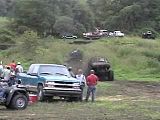Trailmaster01
Marshall
All Good points guys. One I want to add:
If you see something that just doesnt look right, The way the strap is hooked, where it is hooked, the condition, etc. dont let it go, SPEAK UP! Even if you are not involved with the recovery. People get killed every year because they dont know what they are getting into. Broken straps with truck parts attached can do some real damage. Get the kids out of the truck and a safe distance away, move bystanders and Gawkers back, people will want to be right up where the action is, with no fear for thier own lives. Ok, I am done preaching. Check this video out, look at the people standing next to the pulling truck, no cares in the world, even though a 500+hp truck is bunny hopping right at em at 6500RPM
click to play

Thanks a lot for that...it can't be stressed enough the importance of safety..and it's EVERYONE's responsibility..Have fun but do it at a distance:wink5:
